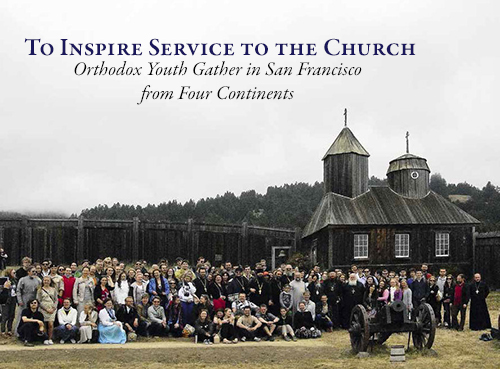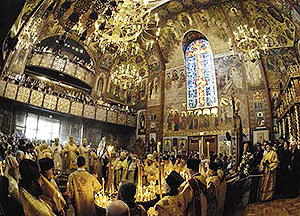
Over 150 participants from 11 countries gathered for the 13 th All-Diaspora Russian Orthodox Youth Conference in San Francisco. Áîëåå The topic was “In the Footsteps of St John: Charity and Social Service,” uniting two main themes: involving youth in parish-level charity and the celebration of the 20 th anniversary of the glorification of St John of Shanghai and San Francisco.
 |
|
|
|
|
|
|
|
|
|
Personal Witness
The conference, which commenced on June 27, 2014, and lasted seven days, was carefully organized. Many have already been accustomed to the form of these conferences including presidia and lectures. These are the primary forms the conference employs, the more lectures read on important topics, the more authoritative the conference becomes.
Other principles were laid at the foundation of this event. Over the course of seven days, there was no presidium. There were five speeches, though calling them “lectures” is not quite accurate. These were more like presentations and open discussions. The bases for these talks were neither theory nor academic investigation, but personal witness. The Venezuelan-Russian businessman and owner of “Rosinter,” Rostislav Ordovsky-Tanaev Blanco, gave such a talk. The title of his talk seemed dull: “Corporate Philanthropy.” Still, the presentation of Rostislav, who had participated in the Second All-Diaspora Russian Orthodox Youth Conference, was brilliant and moving. He talked about how business and philanthropy are closely intertwined in his work in Russia. In various situations, both successful and crisis-oriented, Rostislav follows his life’s credo: without charity there cannot be harmony with either one’s conscience or with society at large. One other phrase was heard time and again: “Life will always grant miracles if one lives according to one’s conscience.”
The President of the Department of Charity and Social Work of the Moscow Patriarchate, His Grace Bishop Panteleimon of Orekhovo-Zuevsk, who made a special visit to San Francisco, spoke not as a high-level ecclesiastical cleric, but as a pastor. His speech did not cover the technology of charity, but the special condition of the heart of a Christian, within which charity becomes organic and natural. “The main goal is to increase love and give everyone the opportunity to know that God is love,” said Vladyka Panteleimon, which made a deep impression on many conferees, who began to view ecclesiastical philanthropy in a different way, spiritually.
The organizers tried to deemphasize the lectures, but reading the program, it was hard to pick out a single main theme. The lectures and development of charitable projects which could be enacted on the parish level, the field trips, choir rehearsals and participation in divine services were all equally important. The overall effect of these various activities reflected a clear and impressive image of church life in general.
A Model for the Future
The most difficult part of the conference was independent work involving developing projects which could be brought to life on the parish or diocesan level. On the second day, the participants were broken up into 14 groups, each one charged with developing one project. These were presented on the last day, which, despite the strict schedule, which only allotted ten minutes per presentation, lasted several hours.
The challenge was to formulate an American-style system: calculate the necessary resources for each project and find funding; and the level of involvement of the clergymen and parishioners. Enacting each project would be a test of church life and the level of understanding of parish life.
It turned out that most of the participants see the form of parish life as it developed historically: summer camps, youth circles, Christmas pageants, helping needy children in orphanages, etc. But there were more original ideas developed: a research center for Orthodox youth, a social database, an Orthodox theater, Orthodox cafe with a bookstore, a center for moral and informational support. It is expected that some of these projects will be brought to life.
The Blessed Experience of Prayer
It was no accident that San Francisco became the center of the first Orthodox Christian diocese in America. Today, church life is very active in this city, and the youth that gathered for this conference learned about the basics of charitable centers: St John Kronstadt healthcare center and chapel and St Anthony Soup Kitchen. Some volunteer work was necessary—young people helped sort clothing for a charity and then shared a meal with the homeless.
Field trips included a visit to the renowned Fort Ross, the first Russian settlement on the Pacific coast of North America, and Corbel vineyard.
Participation in divine services was an important aspect of the conference, especially the celebration of the 20 th anniversary of the canonization of St John of Shanghai and San Francisco. The Cathedral of the Mother of God “Joy of All Who Sorrow” was where all of the hierarchs of the Russian Orthodox Church Outside of Russia gathered, along with a multitude of clergymen and laity. A youth chorus sang during all-night vigil and Divine Liturgy, rivaling the excellence of the cathedral’s own magnificent choir.
During Liturgy on June 29 , Archimandrite Nicholas (Olhovsky) was consecrated to the episcopacy (assigned to Manhattan), and made a Vicar of the Eastern American Diocese. For most of the youth, this was the first time they witnessed a hierarchal consecration.
“I had already attended a celebration of the feast day of St John, and knew what to expect at divine services,” said Elizabeth Kotar of Seattle, WA. “But this was completely different. People were here from all corners of the earth, praying to St John at services lasting hours on end, and I wept. It is hard to express what I felt as I participated in the service of the consecration, hearing the youth choir, the singing of the adults and the clergymen who praised our holy bishop. This blessed experience of prayer in the very first days of the conference set a pious and joyful tone to the whole conference.”
More in Common than Differences
The priests who worked with the youth also did not hide their joy. They saw their main task as inspiring young people to participate more actively in parish life, to show that the Orthodox Christian youth in various countries have more in common than differences. As the young people themselves said, this was an utterly new experience.
“The number of young people who came to the conference was colossal. The most important thing is that they all staunchly confess their Orthodox Christian faith, and it is easy to relate to them all, like they are brothers and sisters. Sadly, we simply did not have time to become very close to them all, but I made acquaintances and potential friends from all over the world: Moscow, St Petersburg, Simbirsk, Parish, Germany, America, Canada and Australia,” said Ilya Kulish of San Francisco.
The youth from Russia were particularly struck by learning about the conference members who have lived abroad following several generations of emigration. The experience helped some overcome stereotypes which are sometimes formed. “I was mostly surprised by the conversations and meetings with the participants of the conference and the parishioners in the San Francisco Cathedral,” said Yaroslav Tsarev of Moscow, a student of St Tikhon Humanitarian University. “When I left for the conference, I was worried that I would find some kind of emigre club where they all talk about how they miss their homeland. But I found people burning with faith, who don’t just go to church out of curiosity, but who read the Holy Fathers and understand serious theological matters.”
“There is a noticeable difference between the descendants of Russian emigres who were born abroad on one hand, and young people who came here from Russia, or who recently emigrated to Europe, America or Australia. The kids who grew up far from their historic homeland preserved their characteristics, their behavior patterns, the way they were raised which was once common among the Russian people, but has been lost,” said Stepan Alkhimenko, who has been living in Darmstadt, Germany, for several years.
For many young Orthodox Christians, what was most important at the conference was not only meeting other youth but spending time with priests and bishops. “I was struck by my meeting with Fr Vyacheslav Davidenko of Toronto,” said Nadezhda Grankina of New York. “I remember how a bunch of us kids were talking to batyushka on our first evening at the hotel. Even though it was late, and the next day was going to be very busy, he answered our questions, gave advice and produced examples from his own life. His joie-de-vivre, great sense of humor and living faith was so captivating, that we didn’t want to leave.”
Protopriest Andrei Sommer, Vice President of the Synodal Youth Department of the Russian Orthodox Church Outside of Russia, the main organizer of the event, summed it up this way: “This pushes us to review how we organize such events, think about its goals and challenges.” This involves the fact that the level of participation (150 people from 11 countries) does not reflect any jurisdictional membership. “But it is important, showing us a very interesting picture,” he said. In fact, it was the first time that young people from 25 different dioceses and six different jurisdiction participated: the Moscow Patriarchate, the Ecumenical Patriarchate (the Greek Orthodox Archdiocese of America), the Serbian Church and the Orthodox Church in America. “This All-Diaspora Conference united Orthodox Christian youth on a scale new to everyone, including us,” said Fr Andrei enthusiastically. “A few years have passed since the signing of the Act of Canonical Communion [between the Moscow Patriarchate and the Russian Orthodox Church Outside of Russia— transl .], and these conference have actually become global in scale!” These closing words by Fr Andrei at the conference drew a standing ovation from the audience.
But now the conference is over, the participants have departed for their homes, and the clergymen who ministered to the youth is facing a new challenge: how to employ this experience and the ideas that were developed at the conference? The conference needs to have resulted in more than just great memories…
Sergei Chapnin
Photos by the author and Protodeacon Eugene Kallaur
e-vestnik.ru
|